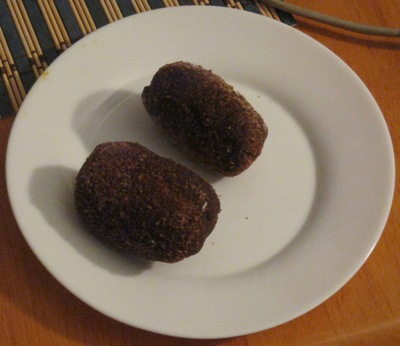Шоколадная картошка
You probably know that chocolate is шоколад in Russian and that potato is картошка. So what if you wanted to say ‘chocolate potato’? In English you simply put the two nouns together in a row. In Russian you can't normally put two nouns together like that and have the first one modify the second. Instead you have to put the first one into adjective form. The adjective from шоколад is шоколадный, so chocolate potato comes out шоколадная картошка.
Now if you are an American, you are probably asking yourself, “Why the heck would I want to say ‘chocolate potato’ in English, much less in Russian?” Oh, my poor ignorant American friend. You need to go to Russia and try the pastry they call шоколадная картошка. You will think you have died and gone to heaven. I encountered my first ones the other day. It was in a little convenience store.
“Are those chocolate?” I asked.
“They are mumble mumble potato mumble,” she replied.
Potato, huh? They kind of look like yeti testicles covered in brown bread crumbs, but what the hell, I'll give 'em a try.

Home. I chomp. OMG! These are a chocolate potato candy! I swoon, I can't stop salivating.
| Я съел десять штук шоколадных картошек. | I ate ten chocolate potatoes. |
| Дайте, пожалуйста, шоколадную картошку, три штуки. | Chocolate potatoes, please, three of them. |
| — Не ешь шоколадную картошку, а то у тебя будут прыщики. — Это полнейший бред. Шоколад лечит прыщики. |
“Don't eat any chocolate potatoes or you'll get pimples.” “That's complete bunk. Chocolate cures pimples.” |
| — Из чего делают шоколадную картошку? — Из яиц, сахара, шоколадного печенья, масла, молока и какао. |
“How do you make chocolate potatoes?” “With eggs, sugar, chocolate cookies, butter, milk and cocoa powder.” |
It turns out that they have no potato in them at all, so in fact they are not chocolate potato candy. They are just deliriously delicious pastries.
10 comments
В жизни бы не догадалась, что статья о пирожном, а не о какой-то странной породе картофеля.
“Картошка” is a type of cake. Thats why картошка and Картошка - is not correctly. Сorrect spelling is “Картошка” (in quotes).
we have the same in Italy and it is really a way to recicle old pastry even if not expired ones.
My grandpa (who was a confectioner) made the same ones, only they were round and not potato-like.
Anyway they are fab as far as I remember. :)
It’s never called “chocolate potato", it’s just “potato". And you figure out it’s a pastry because you buy it in the pastry shop
Don responds: Well, if you look at recipe websites, they label the item as шоколадная картошка, so I chose that for the title. I didn’t actually buy it at a pastry shop. It was a little convenience store down the street that sold a little of everything.
Unfortunately шоколадная картошка is very often used to recycle old pastry. Probably 99% of all картошка you can buy in supermarkets and confectioner’s shops are made from expired cakes and old cookies..
In English you don’t “simply put the two nouns together in a row". The ‘chocolate’ in ‘chocolate potato’ is still an adjective, it just doesn’t need to agree with the noun as in Russian.
Don responds: I will allow myself to disagree with you here. There are some teachers in the US who inform their students that when a first noun modifies a second noun, that first noun is an adjective. Although the difference between nouns and adjectives is pretty thin in English, I would argue that the first noun remains a noun. Among the reasons that cross my mind off the top of my head are:
- Nouns cannot add the suffix -er for comparison as easily as qualitative adjectives, whereas adjectives can. Thus one can take an adj-noun sequence like “a tall man” and modify it to “a taller man,” whereas noun-noun sequences sound funny that way, thus “a chocolate bar” doesn’t sound good if changed to “a chocolater bar.”
- Adjectives do not add the plural suffix -(e)s as easily as nouns do. Thus one can say “the tall students,” but it sounds odd to say “the talls students” or just “I like the talls.”
Such reasons, among others, have lead grammarians to conclude that there are in fact noun-noun modification patterns in English. Among the most prestigious of those grammarians are Quirk, Greenbaum, Leech and Svartik in “A Grammar of Contemporary English.” I link a very bad copy of a couple of pages of their monumental work here.
They are often decorated with tiny pieces of buttercream, which is supposed to make them look like sprouting potatoes. Try googling images for “шоколадная картошка".
I think you forgot the word ‘eat’ in the translation of the third sentence.
Don responds: Fixed!
Form is loading...